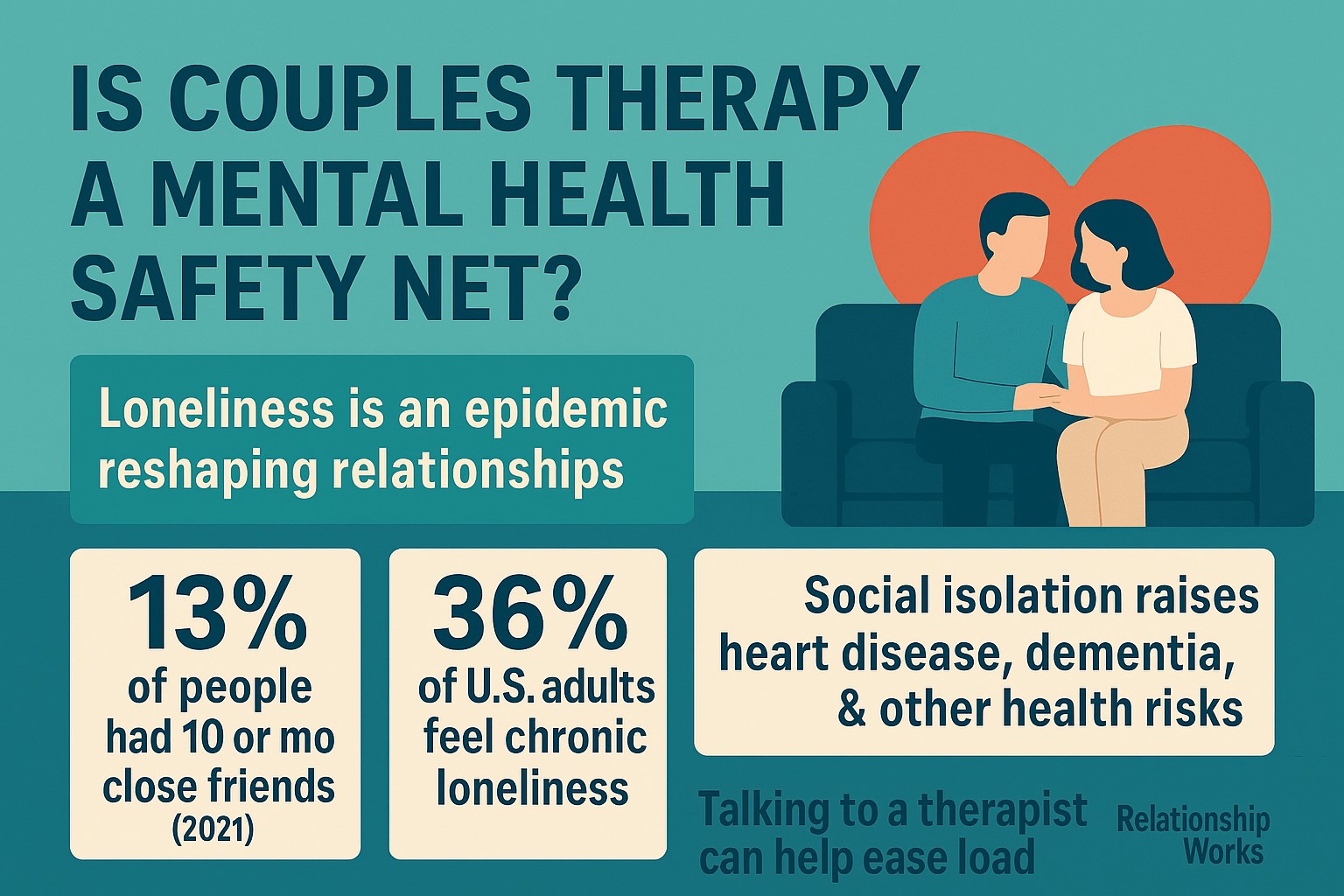How Couples Counseling Is A New Mental Health Safety Net
Written by Yuwei Wu, LMFT, Individual, Couples & Family Therapist
July 20, 2025
Feeling Like Your Relationship Is Carrying Too Much?
Ever feel like your partner is your entire emotional world—and it’s exhausting? You’re not alone.
In 2023, the U.S. Surgeon General officially labeled loneliness a public health crisis, warning that social isolation carries health risks equivalent to smoking 15 cigarettes a day. It increases your chances of heart disease, stroke, dementia, depression, and premature death.
But what many people don’t realize is how this loneliness epidemic is reshaping modern relationships—especially in fast-paced, tech-centered cities like Seattle and Bellevue. As outside friendships fade, more and more couples are turning inward, relying almost entirely on each other for emotional survival.
According to recent studies:
- The percentage of people with 10 or more close friends dropped from 33% in 1990 to just 13% in 2021.
- 36% of U.S. adults report experiencing chronic loneliness.
- Friendship networks have shrunk drastically since COVID, especially among young adults and urban professionals.
In Seattle and Bellevue—where hybrid and remote work remain common—many couples find themselves navigating tension between in-office days, lengthy commutes, and virtual routines. Even as companies encourage returns to the office, hybrid schedules leave relationships straddling digital and in-person worlds. This can deepen emotional isolation—especially when combined with the “Seattle Freeze,” shrinking social circles, and tech-driven pressures.

Why This Hurts Relationships
In today’s world, romantic relationships carry more emotional weight than ever. Popular culture tells us that love should be everything: our partner should be your soulmate, best friend, main source of comfort, and personal cheerleader—all at once. Reality TV shows like Love Island USA (one of streaming’s most-watched series in 2025) and Love Is Blind (whose sixth season set streaming records in 2024) reinforce this ideal.
Similarly, the popularity of wedding-centered shows like Married at First Sight and Say Yes to the Dress constantly frames romantic commitment as the ultimate milestone. These programs imply that finding and maintaining that perfect relationship is synonymous with success—and worth the emotional cost.
But expecting one person to meet all your emotional needs isn’t just unrealistic—it’s exhausting. What previous generations found in extended families and communities, we now expect from one relationship. You may find yourself relying on your partner not just for love, but for emotional support, crisis management, daily reassurance, and constant connection—all while they’re juggling their own work demands (even burnout), personal interests, and everything else life throws at them. While closeness can be beautiful, this emotional overload often leads to hidden stress, conflict, and a painful sense of disconnection.
When your partner becomes your only source of support:
- Small frustrations can feel enormous. If your partner forgets to check in, it can feel like the world is falling apart—not because you’re needy, but because you have no one else to turn to for comfort.
- Simple disagreements—like deciding what to eat for dinner or how to spend a weekend—can turn into heated arguments. These surface-level fights often mask deeper feelings of loneliness and exhaustion.
- Emotional exhaustion builds silently. One partner may start avoiding conversations altogether, leading to feelings of emotional abandonment. The other partner may feel rejected and try even harder to connect, creating a painful cycle of pursuit and withdrawal.
- Resentment can creep in. One or both partners may start to feel trapped by the constant emotional demands, leading to thoughts like, “Why am I always the one holding everything together?”
- A sense of emotional suffocation may develop, even if both partners care deeply for each other. It becomes hard to breathe when every need, fear, or problem gets funneled into a single relationship.
As a couples therapist, I often hear couples ask, “Why does every small argument feel so heavy?”
When you have no other safe place to process stress or share your thoughts, even small challenges inside your relationship can feel overwhelming. Emotional needs that used to be spread across family, friends, and community now rest entirely on your partner’s shoulders. And no one—not even the most loving partner—can carry that weight alone for long without strain.
Loneliness and social isolation are no longer just personal struggles—they’re being recognized as public health challenges. As more people lose connection with their communities, emotional strain lands directly on couples. Therapy isn’t just about healing and growing relationships. It’s a response to a much deeper, societal problem that affects your bond in ways you can’t always see—helping people feel less alone and preventing emotional burnout inside their most important connection.
Couples therapy helps you recognize and break this painful cycle. But first, it helps you understand: it’s not your fault.Your relationship isn’t broken—it’s simply carrying too much.
How to Stay Connected Without Relationship Burnout
When your relationship feels like it’s carrying too much, small changes can make a real difference. Here are three simple strategies couples can try:
1. Schedule Small Moments of Connection
Carve out just 10–15 minutes each day for intentional, tech-free time together—whether it’s morning coffee, a walk, or simply checking in after work. The goal is to listen and be fully present for each other. You can let each other know what you hear and understand, but there’s no burden or expectation to problem-solve. These small rituals help nurture your bond without adding pressure.
2. Ask: “Do You Want Me to Listen or Problem-Solve?”
When one of you is stressed, this simple question can prevent misunderstandings and ease emotional overload. Listening and problem-solving are both forms of support, but they meet different needs.
Saying this directly avoids the unspoken expectation that your partner should just know what you need. It helps reduce conflict and frustration by creating emotional safety through clear, open communication.
3. Make One Small Change at a Time
When life feels overwhelming, trying to fix everything at once can leave you feeling more stuck. Change takes energy—and focusing that energy on small, lasting shifts helps set you up for success.
Instead of adding more to your plate, focus on making just one small, doable change that lightens your load or strengthens your connection. Maybe it’s skipping one non-essential commitment, saying no to a new task, or choosing one moment of connection each day. Let that be enough for now, and protect the space you have.
How Couples Counseling Can Help
Love shouldn’t feel like a burden. It’s about building a safe, resilient foundation that holds both of you. If you’re feeling stuck even after trying small changes, you don’t have to do this alone. Couples counseling can help you create deeper, lasting change. At Relationship Works, I believe couples therapy isn’t just for when things fall apart. It’s a proactive safety net that strengthens emotional resilience and protects your relationship from overload.
1. A Safe Space to Share Feelings
In therapy, you’ll both learn how to share emotions safely, without triggering defensiveness or blame. You no longer have to carry your struggles alone—or overload your partner.
2. Rebuild Connection Using EFT
Through Emotionally Focused Therapy (EFT), I help couples:
- Communicate clearly and kindly
- Tune into each other’s needs
- Build a secure, lasting emotional bond
These skills reduce conflict and help both partners feel emotionally safe and cared for.
3. Balance Support Without Burnout
Couples counseling teaches you how to:
- Notice signs of burnout
- Set healthy, loving boundaries
- Encourage friendships and outside support
- Stay connected without feeling drained
4. Healthier Minds, Stronger Relationships
Therapy doesn’t just help your relationship—it protects your health. Couples who attend therapy experience:
- Less anxiety and depression
- Greater relationship satisfaction
- Improved emotional and physical well-being
In a world where isolation harms both body and mind, couples therapy provides the support you need.
Begin Couples Counseling in Seattle or Bellevue
Maybe you’ve been feeling overwhelmed, disconnected, or unsure how to move forward in your relationship. That’s completely valid. Relationships carry a lot in today’s isolating world—and it’s okay to need support.
Whether you’re feeling disconnected, overwhelmed, or stuck, I’m here to help you and your partner find a sustainable path forward as a team.
Book your free 20-minute consultation to take the first step toward couples counseling in Seattle or Bellevue and build the connection you both deserve.
Learn more about EFT services at Relationship Works.
Further Reading
Harvard Graduate School of Education. (2021). Loneliness in America: How the pandemic has deepened an epidemic of loneliness and what we can do about it. Making Caring Common Project. https://mcc.gse.harvard.edu/reports/loneliness-in-america
Survey Center on American Life. (2021). American friendships: Less close than you think. American Enterprise Institute. https://www.americansurveycenter.org/research/american-friendships-less-close-than-you-think/
World Economic Forum. (2022, November 22). Friendships: Why less is now more. https://www.weforum.org/agenda/2022/11/friendships-less-is-now-more/
Johnson, S. (2008). Hold me tight: Seven conversations for a lifetime of love. Little, Brown Spark. https://iceeft.com/what-is-eft/
